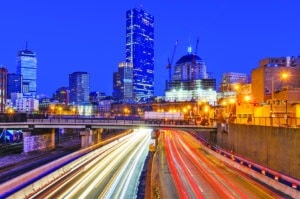
Boston-area drivers spent, on average, 164 hours caught in traffic in 2018 according to traffic data firm INRIX, equivalent to a whole month of workdays.
Boston may have lost its shots at the Super Bowl, NBA Finals and World Series in 2019 but there’s one title it didn’t lose: worst traffic in the country for the second year running.
Global traffic analytics firm INRIX found Greater Boston drivers lose an average of 149 hours each year to congestion, compared to 145 hours in second-place metro area Chicago, 142 hours in third-place metro Philadelphia and 103 hours in stereotypically traffic-choked Los Angeles. Los Angeles’ reputation was still somewhat deserved, however, with two of the city’s major arteries – Interstate 5 and US 101 – taking first and second place as the most congested roads in the country. New York’s Brooklyn Queens Expressway took third place. No Boston highways made INRIX’s top 10 list of America’s most-congested highways.
In Boston, that time lost comes out to $2,205 per driver per year, or $4.1 billion for the entire city. Nation-wide, Americans lost an average 99 hours a year each due to congestion, costing them nearly $88 billion in 2019, an average of $1,377 per year.
“Congestion costs Americans billions of dollars each year. However, it appears to be stabilizing in some of the country’s most congested metros – with delays raising roughly three percent nationwide since 2017,” Trevor Reed, transportation analyst at INRIX, said in a statement. “The continued innovation and investment in smarter roadway management is showing early signs of progress. To reflect an increasingly diverse mobility landscape, the 2019 Global Traffic Scorecard includes both public transport and biking metrics for the first time.”
The report contained a sliver of good news for Greater Boston: The average total hours area a resident loses in traffic dropped 5 percent compared to 2018. However, 2019’s figure was still above 2017’s figure.
The news comes days after the state House of Representatives passed a pair of major funding bills for transportation projects: a tax package meant to boost funding for road and rail projects by $600 million a year, and an $18 billion bonding bill designed to fund existing projects like the Green Line Extension and offer limited funding for certain new projects, like replacements for the Cape Cod Canal’s bridges. Transportation advocates, however, have said the bill is insufficient to meet the region’s traffic challenges.




 |
| 

